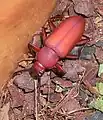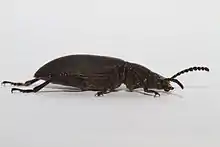| Zophobas morio | |
|---|---|
.jpg.webp) | |
| Scientific classification | |
| Domain: | Eukaryota |
| Kingdom: | Animalia |
| Phylum: | Arthropoda |
| Class: | Insecta |
| Order: | Coleoptera |
| Infraorder: | Cucujiformia |
| Family: | Tenebrionidae |
| Genus: | Zophobas |
| Species: | Z. morio |
| Binomial name | |
| Zophobas morio (Fabricius, 1776) | |
| Synonyms | |
| |
Zophobas morio is a species of darkling beetle, whose larvae are known by the common name superworm, kingworm, morio worm or simply Zophobas. Superworms are common in the reptile pet industry as food, along with giant mealworms, which are Tenebrio molitor larvae sprayed with juvenile hormone.
The larvae resemble very large mealworms, about 50 to 60 mm (1.7–2.25 in) long when full size, but unlike mealworms, the ends of their bodies are very dark, almost resembling a black color. Once they reach adult size, the larvae pupate, and later emerge as large, light coloured beetles, which in time darken to black. The larvae will not pupate if kept in a container with many other larvae and plentiful food, where they receive constant bodily contact. Keeping superworms this way is commonly used to hinder pupation. To mature the superworms, they must be kept alone for about 7–10 days. They will then, upon maturation, emerge from their pupal stage as darkling beetles.[1]
Superworms are accepted by lizards, turtles, frogs, salamanders, birds, koi and other insectivorous animals. Their nutritional values are similar to those of mealworms, so it is possible that supplementation with calcium is necessary if they are used as a staple food item. In some cases they are preferred over mealworms due to their softer exoskeleton,[2] making them more digestible to some reptiles. The larvae are odor-free (but the beetles possess a pungent chemical defense that may be released when provoked), and can be easily contained, making them ideal for raising at home to feed a collection of captive insectivores. The nutritional profile of the larvae is "46.80% proteins, 43.64% lipids, 8.17% ashes and 1.39% carbohydrates."[3]
Relationship with humans
As pet feed
As with the popular mealworm, Zophobas morio larvae (commonly known as superworms) are widely used in pet care, more specifically as feed.
Superworms are relatively high in protein and fat, which make them attractive pet feed for captive reptiles, amphibians, fish, and birds. Their ability to stay alive without eating for 1–2 weeks makes the keeping process highly feasible for bulk commercial availability around the world. However, pet owners are advised to keep them in warm temperatures as, unlike the mealworm, superworms do not enter the process of hibernation. They are also known to bite when threatened by handling, although the bite is not very painful.
As waste disposal agents
Zophobas morio larvae, Tenebrio molitor larvae, and Tenebrio obscurus larvae all have been found to consume expanded polystyrene foam.[4] Zophobas morio breaks down polystyrene through a two-stage process: first by mechanically shredding the plastic into smaller pieces through chewing, which exposes pieces to oxygen atoms, and then by using bacterial gut enzymes to depolymerize the pieces.[5][6] Zophobas morio larvae fed a polystyrene diet were more active and managed to gain a slight amount of weight compared to the same type of larvae on a starvation diet.[7][8]
Distribution
This beetle occurs naturally in tropical regions of Central and South America, but has spread across the world for use as food for reptiles and other insectivorous pets.
See also
Gallery
 Young beetle
Young beetle Adult beetle
Adult beetle Pinned adult specimen
Pinned adult specimen
References
- ↑ Rumbos, C I; Athanassiou, C G (2021-04-09). "The Superworm, Zophobas morio (Coleoptera:Tenebrionidae): A 'Sleeping Giant' in Nutrient Sources". Journal of Insect Science. 21 (2). doi:10.1093/jisesa/ieab014. PMC 8033247. PMID 33834209. Retrieved 2021-05-23.
- ↑ Mealworms vs. Superworms (the difference?) - answered. Wormmy. (2022, August 12). Retrieved 2023-03-21.
- ↑ Soares Araújo, Rafael Ribeiro; dos Santos Benfica, Tatiana Aparecida Ribeiro; Ferraz, Vany Perpetua; Moreira Santos, Eleonice (March 2019). "Nutritional composition of insects Gryllus assimilis and Zophobas morio: Potential foods harvested in Brazil". Journal of Food Composition and Analysis. 76: 22–26. doi:10.1016/j.jfca.2018.11.005. S2CID 104437154.
- ↑ Yang, Li; Gao, Jie; Liu, Ying; Zhuang, Guoqiang; Peng, Xiawei; Wu, Wei-Min; Zhuang, Xuliang (1 January 2021). "Biodegradation of expanded polystyrene and low-density polyethylene foams in larvae of Tenebrio molitor Linnaeus (Coleoptera: Tenebrionidae): Broad versus limited extent depolymerization and microbe-dependence versus independence". Chemosphere. 262: 127818. doi:10.1016/j.chemosphere.2020.127818. ISSN 0045-6535.
- ↑ Ong, Sandy (24 August 2023). "The living things that feast on plastic". Knowable Magazine | Annual Reviews. doi:10.1146/knowable-082423-1.
- ↑ Sun, J; Prabhu, A; Aroney, STN; Rinke, C (June 2022). "Insights into plastic biodegradation: community composition and functional capabilities of the superworm (Zophobas morio) microbiome in styrofoam feeding trials". Microbial Genomics. 8 (6). doi:10.1099/mgen.0.000842. PMC 9455710. PMID 35678705.
- ↑ Samuels, Fionna (June 9, 2022). "'Superworms' Eat—and Survive on—Polystyrene". Scientific American.
- ↑ Kilvert, Nick (9 June 2022). "'Superworms' survive solely on polystyrene, as researchers look to create plastic recycling technology". ABC Science.
Further reading
- Freye, Henry B.; Esch, Robert E.; Litwin, Catherine M.; Sorkin, Louis (1 July 1996). "Anaphylaxis to the Ingestion and Inhalation of Tenebrio molitor (Mealworm) and Zophobas morio (Superworm)". Allergy and Asthma Proceedings. 17 (4): 215–9. doi:10.2500/108854196778996903. PMID 8871741.
- Leung, Dong; Yang, Depo; Li, Zhuoxue; Zhao, Zhimin; Chen, Jianping; Zhu, Longping (5 January 2012). "Biodiesel from Zophobas morio Larva Oil: Process Optimization and FAME Characterization". Industrial & Engineering Chemistry Research. 51 (2): 1036–1040. doi:10.1021/ie201403r.
- Prado, R. A.; Santos, C. R.; Kato, D. I.; Murakami, M. T.; Viviani, V. R. (2016). "The dark and bright sides of an enzyme: a three dimensional structure of the N-terminal domain of Zophobas morio luciferase-like enzyme, inferences on the biological function and origin of oxygenase/luciferase activity". Photochemical & Photobiological Sciences. 15 (5): 654–665. doi:10.1039/C6PP00017G. PMID 27101527.
- Latney, La'Toya V.; Toddes, Barbara D.; Wyre, Nicole R.; Brown, Dorothy C.; Michel, Kathryn E.; Briscoe, Johanna A. (February 2017). "Effects of various diets on the calcium and phosphorus composition of mealworms (Tenebrio molitor larvae) and superworms (Zophobas morio larvae)". American Journal of Veterinary Research. 78 (2): 178–185. doi:10.2460/ajvr.78.2.178. PMID 28140633.